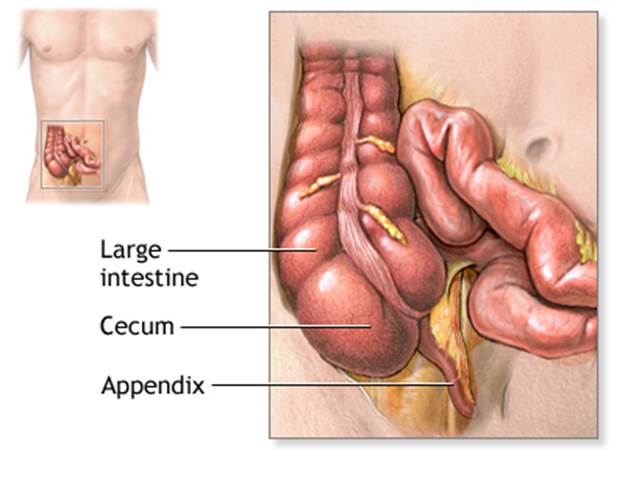Appendicitis in children
Appendicitis can be hard for a parent to diagnose, though. At first, it may seem a lot like stomach flu. The classic symptoms are abdominal pain, fever, and vomiting. (In rare cases, it can also cause diarrhea.)
Another telltale sign — although it's not always present — is pain that begins near the belly button then gets worse and moves to the lower right part of the abdomen.
Your child's abdomen may be distended and sensitive to your touch, and he may limp or bend over on his right side if his inflamed appendix irritates the muscles that lead to his leg.
What is appendicitis?
Appendicitis is the inflammation and infection of the appendix — a small, hollow, finger-shaped organ that sits at the beginning of the large intestine. This inflammation and infection can happen when bacteria get trapped in the appendix by hard stool or a large lymph node compressing and blocking the opening.

The appendix is a small, finger-shaped pouch of intestinal tissue arising from the cecum near its junction with the small intestine.
Once the appendix is infected, it must be removed to prevent it from bursting and spreading the infection into the abdomen.
How common is appendicitis?
Appendicitis is the most common cause of abdominal emergency surgery. In Western countries, 7 percent of the population will have appendicitis in their lifetime. The peak age for getting appendicitis is between 10 and 30.
The overall number of cases of appendicitis seems to be declining. Experts say this may be because people are getting more fiber in their diet, which may help prevent blockage.
Are there risk factors?
People with a family history of appendicitis seem to be more prone, and males are slightly less susceptible than females. If your child has cystic fibrosis, an inherited disease that causes digestive and respiratory problems, he's also more likely to get appendicitis.
What should I do if I think my child has appendicitis?
Call your child's doctor. She should be able to tell you whether you need to bring your child to the emergency room. It's important that appendicitis not be left untreated, because the appendix could rupture, spreading the infection into your child's abdominal cavity.
In the meantime, don't give your child laxatives or an enema. These could cause his appendix to burst. Just try to keep him calm.
Once at the hospital, the doctor will examine your child. She may do X-rays, an ultrasound, or a CAT scan — all painless procedures that can help her get a better picture of your child's appendix.
The doctor may do a blood test to see if there's an infection and a urine test to make sure that a urinary tract infection isn't responsible for your child's symptoms. She may also consult with a surgeon, who will decide whether your child needs surgery.
What's the surgery like?
Your child will be given general anesthesia, and the surgeon will make an incision in his abdominal wall. She'll then detach the appendix from the large intestine and drain any fluid that has accumulated due to the infection.
Some surgeons perform the procedure using an instrument called a laparoscope, a tiny camera on the end of a probe, which allows them to see what they're doing inside without making a large incision.
Afterward, the doctor will give your child antibiotics to prevent the incision from becoming infected. Your child will stay in the hospital for one to three days after the surgery.
What happens if my child's appendix has burst?
If the bacterial infection becomes severe, the appendix may burst, spilling the bacteria from the infected organ into the abdominal cavity. If this happens, your child will be admitted to the hospital and given an IV that will deliver antibiotics directly into his bloodstream to fight off the infection.
Surgery will still be necessary, and the surgeons will discuss with you the best timing for the procedure and the length of time your child will need IV antibiotics.

